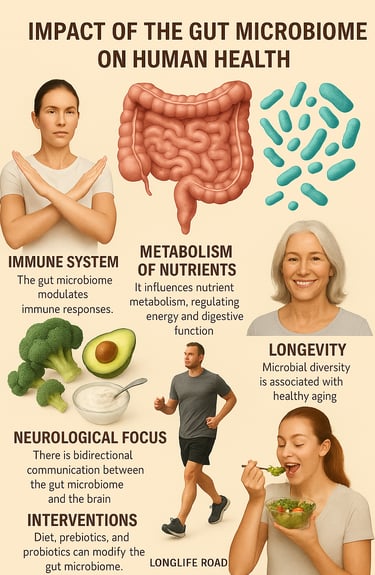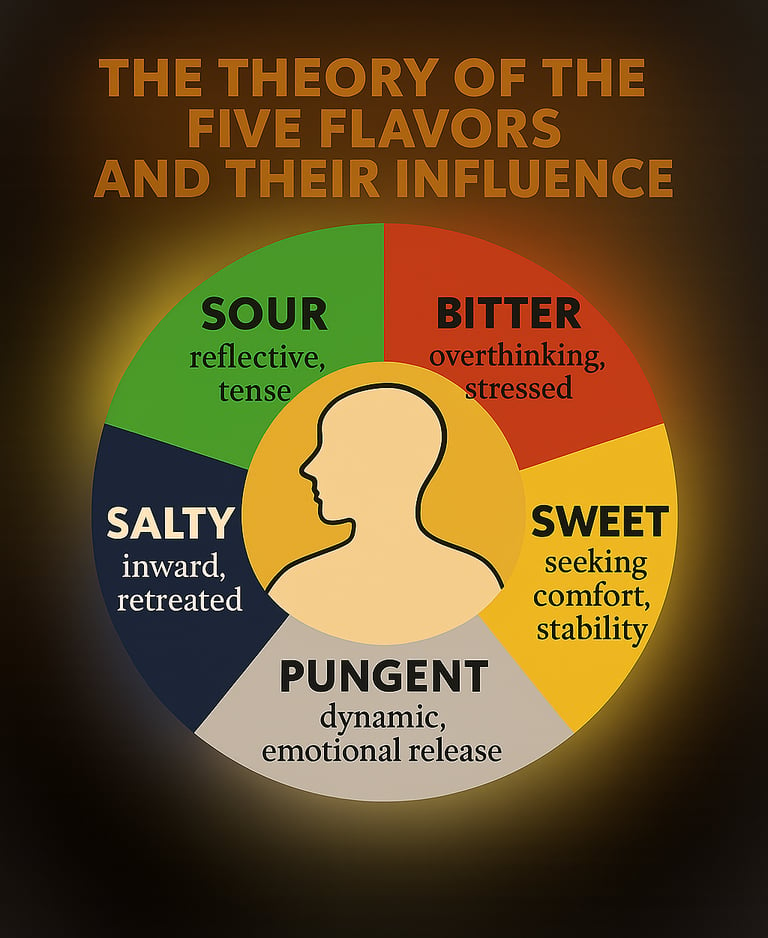

Essential aspects for a longer youth
The Gut Microbiome and Its Impact on Human Health
In recent years, the gut microbiome has emerged as a key component in maintaining human health, affecting not only digestive function but also immunological, neurological, and metabolic aspects. The complex community of bacteria, viruses, fungi, and archaea that resides in the gastrointestinal tract has a decisive influence on multiple physiological processes.
One of the most important findings is the relationship between intestinal microbial diversity and immune function. According to Zhou et al. (2021), greater bacterial diversity is associated with better regulation of the immune system, which reduces chronic inflammation and the risk of autoimmune diseases. This relationship has been evidenced in studies that analyze the microbiota in patients with inflammatory diseases such as ulcerative colitis and Crohn's disease.
Additionally, the gut microbiome has been shown to play a fundamental role in metabolic health. Recent studies show that an imbalance in microbial composition, also known as dysbiosis, is associated with the development of obesity, type 2 diabetes, and metabolic syndrome (Wang et al., 2023). The microbiota influences nutrient absorption, the production of short-chain fatty acids, and insulin regulation, which underscores its importance as a therapeutic target.
In the neurological field, the gut-brain axis has captured increasing attention. Research such as that by Cryan et al. (2023) has identified that certain bacterial strains can modulate the production of neurotransmitters like serotonin and GABA, directly impacting mood and mental health. This suggests a link between intestinal dysbiosis and disorders such as anxiety and depression.
On the other hand, gut health also appears to be related to longevity. According to a longitudinal study by Lehtimäki et al. (2022), older individuals with a rich and stable microbiota showed a lower incidence of chronic diseases and a better quality of life. A favorable bacterial composition seems to protect against systemic inflammation and cognitive decline.
Finally, dietary and probiotic interventions have proven to be effective in positively modulating the gut microbiome. A recent meta-analysis conducted by Johnson et al. (2024) concluded that the regular consumption of fiber, fermented foods, and probiotic supplements can restore microbial balance and improve clinical parameters related to digestive and metabolic health.
Taken together, current scientific evidence confirms that the gut microbiome is a fundamental player in human health, with effects that transcend the digestive system and reach other vital systems. Its study and modulation represent a promising area for the prevention and treatment of complex diseases.


Cryan, J. F., O’Riordan, K. J., Cowan, C. S., Sandhu, K. V., Bastiaanssen, T. F. S., Boehme, M., ... & Dinan, T. G. (2023). The microbiota-gut-brain axis and the potential of microbiome-based interventions in mental health. Annual Review of Pharmacology and Toxicology, 63, 23–45.
Johnson, E. L., Thomas, D. S., Wu, C., & Wang, Y. (2024). Dietary interventions and modulation of the human gut microbiome: A meta-analysis of clinical trials. Nutrients, 16(1), 112.
Lehtimäki, T., Salosensaari, A., Havulinna, A. S., & Lahti, L. (2022). Gut microbiota diversity and health outcomes in aging populations: A longitudinal cohort study. Nature Aging, 2, 603–612.
Wang, B., Yao, M., Lv, L., Ling, Z., & Li, L. (2023). The human microbiota in health and disease. Engineering, 9(2), 215–229.
Zhou, Y., Xu, H., Xu, J., & Chen, Y. (2021). Gut microbiota: The emerging link to autoimmune diseases. Frontiers in Immunology, 12,

People can go beyond their physical and emotional limitations by connecting the mind and energy. Through neuroscience, epigenetics, and quantum physics, you can reprogram your brain to change limiting beliefs and access elevated states of consciousness. With practices like meditation, breathwork, and visualization, you can learn to create a new reality and heal your body from the inside


Master your mind, produce more energy, and heal your body

Regular physical exercise stimulates mitochondrial biogenesis, a key process in cellular energy production. Recent studies have shown that aerobic training increases the expression of PGC-1α coactivator, a master regulator in the formation of new mitochondria (Egan & Zierath, 2021). The greater the number of mitochondria, the greater the muscle's ability to generate adenosine triphosphate (ATP), the body's main energy molecule. This not only improves physical performance but also overall metabolic function, reducing the risk of chronic diseases such as type 2 diabetes and cardiovascular diseases (Perry et al., 2021). Furthermore, exercise enhances the efficiency of oxidative metabolism, which allows for more sustained and efficient energy production, even at rest. Therefore, moving regularly not only strengthens the body but also optimizes its energy machinery at a cellular level.
References
Egan, B., & Zierath, J. R. (2021). Exercise metabolism and the molecular regulation of skeletal muscle adaptation. Cell Metabolism, 33(5), 1022–1035.
Perry, C. G., Lally, J., Holloway, G. P., Heigenhauser, G. J., Bonen, A., & Spriet, L. L. (2021). Repeated transient mRNA bursts precede increases in transcriptional and mitochondrial proteins during training in human skeletal muscle. The Journal of Physiology, 599(9), 2439–2454.
More mitochondria extend your lifespan

In Traditional Chinese Medicine (TCM), the five flavors—sour, bitter, sweet, pungent, and salty—serve not only a nutritional function but also an energetic and emotional one. Each flavor is associated with an organ, an element from the Five Elements Theory (Wu Xing), and a type of emotional or behavioral response.
Sour (Wood Element – Liver): Has astringent and stabilizing effects. It is associated with thoughtful, perfectionistic, or tense individuals. An excess can increase irritability.
Bitter (Fire Element – Heart): Disperses heat and dries dampness. People with a tendency to overthink or have emotional stress may reject bitter foods, even though they might need them for balance.
Sweet (Earth Element – Spleen): Tonifies, harmonizes, and moistens. It is associated with the need for emotional comfort. An excessive craving for sweet foods can indicate insecurity or a search for emotional stability.
Pungent (Metal Element – Lungs): Disperses and moves energy. People who choose pungent foods often seek stimulation, dynamism, or emotional release.
Salty (Water Element – Kidneys): Softens masses and purges. Related to what is deep and instinctive, a preference for salty foods can reflect a search for internal connection or emotional withdrawal.
From the perspective of Jing Fang, flavors are also present in medicinal herbs, which balance physical and emotional states according to their thermal nature (cold/hot) and their energetic direction (ascending, descending, etc.).
This theory holds that our food preferences reflect internal imbalances and, at the same time, can serve as tools to reconnect the body, mind, and emotions, thereby promoting more conscious and therapeutic dietary decisions


Huang, D. (2021). The Yellow Emperor’s Classic of Medicine (Huangdi Neijing) (I. Veith, Trans.). University of California Press. (Obra original escrita ca. 2.500 a.C.)
Zhao, J. & Xie, X. (2017). Jing Fang: Classical Herbal Formulas and the Five Element Approach. Blue Poppy Press.


The five flavors theory
